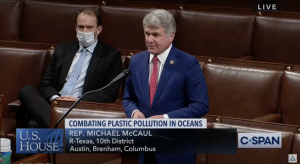ICYMI: McCaul Speaks on House Floor in Support of PLASTICS Act
Washington D.C.—Congressman Michael McCaul (R-TX), Lead Republican of the House Foreign Affairs Committee, spoke on the House Floor in support of the Partnering and Leveraging Assistance to Stop Trash for Cleaner Seas (PLASTICS) Act, legislation aimed at reducing marine debris and plastic waste in the ocean.
-Opening Remarks as Delivered-
Click to Watch Opening Remarks
“Thank you, Mr. Speaker, I want to thank the gentleman from New York for his support and Chairman Engel.
“Mr. Speaker, over 8 million metric tons of plastic enters the oceans each year. That’s the equivalent of a garbage truck full of plastic being dumped out every single minute.
“According to the United Nations environment program, if no change is enacted, our oceans could contain more plastic than fish by 2050.
“Mismanaged plastic waste in our oceans and communities can take centuries to decompose.
“That threatens economic development, hurts marine life and threatens health systems around the world.
“Reversing the trend of increased plastic waste in our oceans will require a coordinated global response.
“And it’s important to note that just ten river systems carry an estimated 90 percent of river-based plastic waste to the ocean.
“China contributes the largest share of this mismanaged waste, followed by developing countries such as Indonesia, the Philippines, Thailand, and Vietnam.
“That’s why Chairman Engel and I introduced the PLASTICS Act.
“This legislation elevates the United States to a leadership role in international efforts to reduce and safely manage plastic waste.
“The PLASTICS Act will allow America to do more to help build the capacity of developing countries to manage their waste.
“And it will help prevent more waste from spilling into the ocean on the scale that it is today.
“The PLASTICS Act elevates ongoing efforts by USAID, and it prioritizes new partnerships between the private-sector and the U.S. Development Finance Corporation.
“This will allow us to leverage additional financing for companies putting these waste management practices into place in the Indo-Pacific and elsewhere.
“So I’m pleased that yesterday, Mr. Speaker, the United States Development Finance Corporation announced its Ocean Plastics Initiative, based on this bill, and it’s exactly what this bill calls for.
“This initiative aims to catalyze $2.5 billion in private sector infrastructure investments aimed at reducing plastic waste and marine debris.
“And by elevating the role of women and marginalized populations in these initiatives, we can spur economic development and opportunity across the globe.
“Our work to combat plastic waste is an investment in the health of our oceans and our communities, not just for ourselves, but also, Mr. Speaker, for future generations.”
-Closing Remarks as Delivered-
Click to Watch Closing Remarks
“Thank you, Mr. Speaker. In closing, as my colleagues and I have been speaking on this bill for the last 10 minutes, over 300,000 pounds of plastic has entered our oceans. It’s amazing to think about that – just in the 10 minutes we’ve been speaking here today.
“Reversing this trend and preventing plastic from choking our oceans will require this coordinated global response that is practical, innovative, measurable, and quite frankly, it’s the right thing to do for our future generations.
“With the PLASTICS Act, we will be taking a huge, large step in that direction.
“We have a duty to protect future generations from the repercussions of today’s waste.
“I also strongly support ongoing efforts to ensure final passage of Save Our Seas 2.0 Act, which includes components of this legislation.
“So I want to thank my colleagues on both sides of the aisle for their great bipartisan work. And I want to thank my dear Chairman, Eliot Engel, and the gentleman from New York.
“Chairman Engel has been a great friend of mine in this Congress. We’re going to be sad to see him go, but I know he has bright aspirations for his future, and we look forward to celebrating with him. And one way we can celebrate this is by passing the PLASTICS Act.”
###
